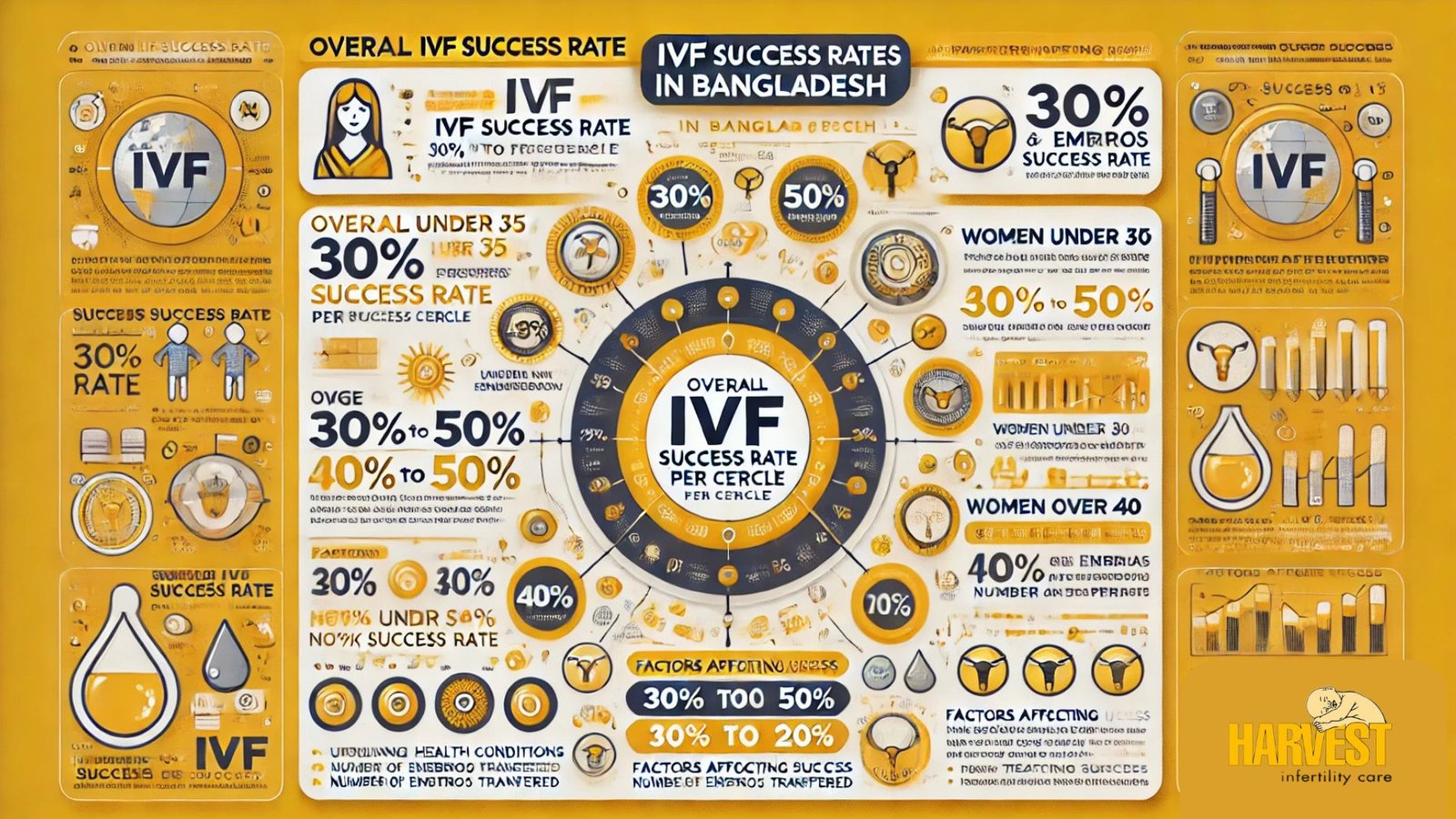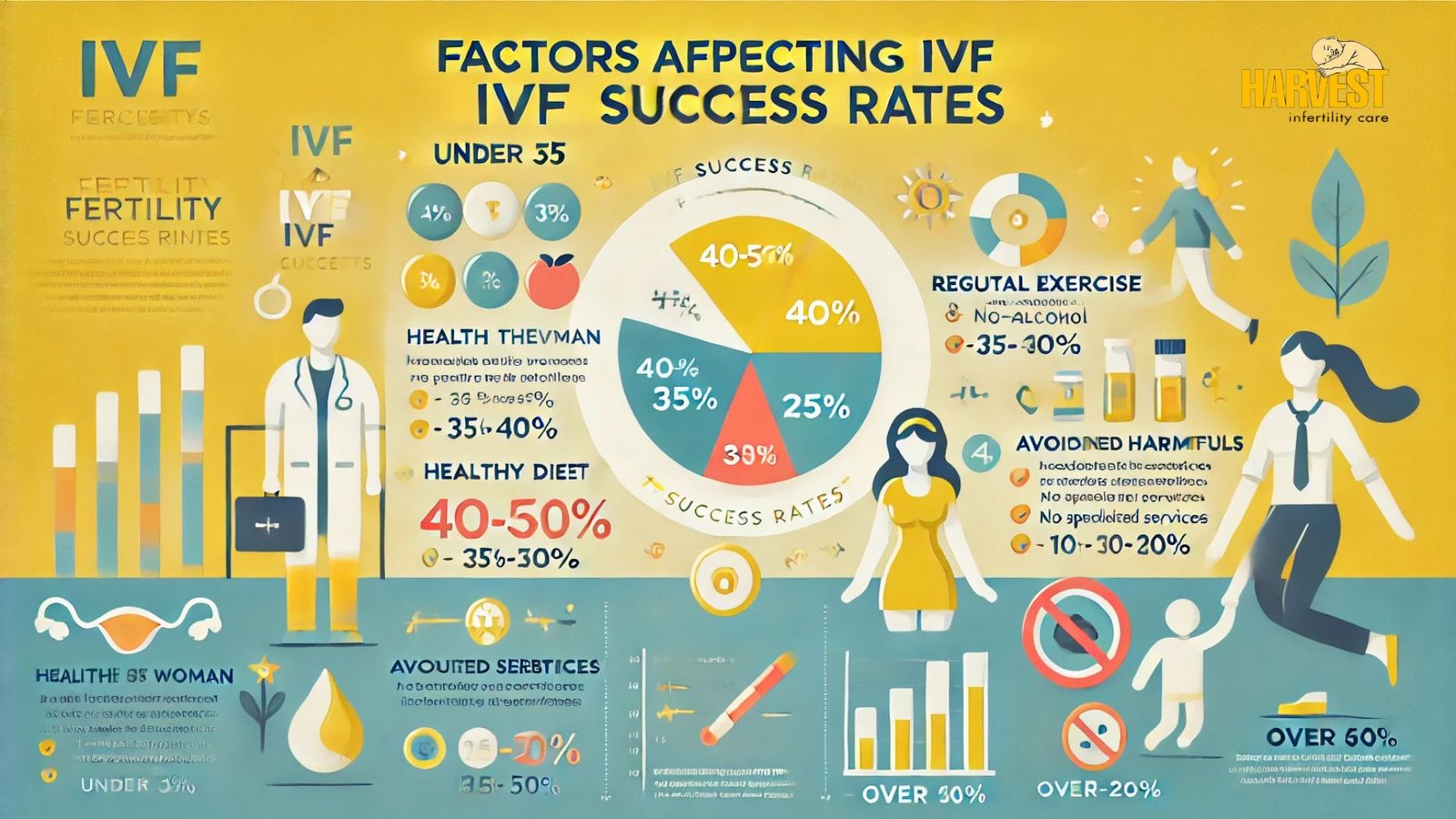In Vitro Fertilization (IVF) has become a widely sought-after solution for couples struggling with infertility in Bangladesh. As hopeful parents embark on this journey, one of the most pressing questions is: What are the success rates of IVF in Bangladesh? Understanding these rates and the factors that influence them is crucial for making informed decisions. In this article, we’ll explore IVF success rates in Bangladesh, delve into the various factors affecting these chances, and provide insights on optimizing your chances for a successful outcome.
IVF Success Rates in Bangladesh

The success rate of IVF can vary significantly based on multiple factors, but on average, IVF success rates in Bangladesh range from 30% to 50% per cycle. Various clinics may report different statistics, influenced by their specific patient demographics and treatment protocols. It’s essential to consider that these rates may fluctuate based on the following:
- Patient Age: Age is a significant determinant of IVF success. Younger women, particularly those under 35, generally have higher success rates. Studies show that women aged 35 and under can achieve success rates of 40% to 50%, while those over 40 may experience rates as low as 10% to 20%.
- Underlying Health Conditions: Conditions such as Polycystic Ovary Syndrome (PCOS), endometriosis, and uterine abnormalities can negatively impact IVF outcomes. Women with these conditions may require additional treatments or interventions that can influence overall success.
- Egg and Sperm Quality: The quality of eggs and sperm plays a crucial role in fertilization and embryo development. High-quality gametes lead to healthier embryos and higher chances of successful implantation.
- Number of Embryos Transferred: Transferring multiple embryos can increase the chances of pregnancy. However, it also raises the risk of multiple pregnancies, which can lead to complications. Most clinics in Bangladesh adhere to guidelines regarding the number of embryos transferred, aiming to balance success rates with patient safety.
- Treatment Protocols: The specific IVF protocols followed by a clinic can influence success rates. Clinics that utilize advanced techniques, such as ICSI (Intracytoplasmic Sperm Injection) or PGD (Preimplantation Genetic Diagnosis), may have higher success rates, particularly for couples with fertility issues.

Factors Affecting IVF Success Rates
Understanding the various factors influencing IVF success rates is vital for couples considering this treatment. Here are some key elements to consider:
1. Age of the Woman
As previously mentioned, age is one of the most significant factors affecting IVF success. A woman’s egg quality declines with age, leading to decreased fertilization rates and lower chances of implantation. For instance:
- Under 35: 40-50% success rate
- 35-37: 35-40% success rate
- 38-40: 25-30% success rate
- Over 40: 10-20% success rate
2. Health and Lifestyle Factors
Health conditions such as obesity, smoking, and excessive alcohol consumption can adversely impact fertility. Maintaining a healthy lifestyle can improve overall reproductive health and boost IVF success rates. Key lifestyle factors include:
- Healthy Diet: A balanced diet rich in vitamins and minerals can improve egg and sperm quality.
- Regular Exercise: Maintaining a healthy weight through regular physical activity can enhance fertility.
- Avoiding Harmful Substances: Limiting alcohol intake and quitting smoking are essential for optimizing fertility.
3. Previous Fertility Treatments
Couples with a history of unsuccessful fertility treatments may face challenges during subsequent IVF cycles. Understanding why previous attempts failed can help tailor future treatment plans to improve outcomes.
4. Quality of the Fertility Clinic
The clinic’s reputation and experience play a crucial role in determining IVF success rates. When selecting a fertility clinic in Bangladesh, consider the following:
- Success Rates: Look for clinics that provide transparent information about their success rates.
- Patient Reviews: Research patient testimonials and success stories to gauge the clinic’s quality of care.
- Specialized Services: Choose a clinic that offers advanced reproductive technologies and personalized treatment plans.
Optimizing Your Chances for IVF Success
While many factors influencing IVF success are beyond your control, there are several steps you can take to enhance your chances of a successful outcome:
- Choose the Right Clinic: Research and select a reputable clinic with high success rates and positive patient feedback.
- Consult with Experts: Work closely with your fertility specialist to create a tailored treatment plan that addresses your specific needs and conditions.
- Maintain a Healthy Lifestyle: Focus on a balanced diet, regular exercise, and avoiding harmful substances to support your reproductive health.
- Stay Informed: Educate yourself about the IVF process and potential risks to make informed decisions.
- Seek Emotional Support: The IVF journey can be emotionally taxing. Consider joining support groups or seeking counseling to navigate the emotional aspects of fertility treatments.
Conclusion
Understanding IVF success rates in Bangladesh and the factors that influence them is crucial for couples considering this path to parenthood. While average success rates range from 30% to 50%, individual outcomes can vary widely based on factors such as age, health, and the quality of the clinic. By taking proactive steps to optimize your chances and seeking support throughout the journey, you can increase the likelihood of a successful IVF experience. With the right information and guidance, hopeful parents can navigate their fertility journey with confidence and hope.